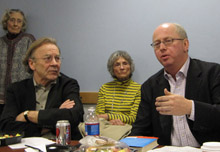
February 23, 2010 — The Economist’s American business editor and New York bureau chief, Matthew Bishop, spoke at the Shorenstein Center on the media and the economic crisis. He opened with the statement that on September 15, 2008, the date Lehman Brothers went bankrupt, “capitalism as we knew it ended, and a debate ought to begin on what we could do to improve the version we now have so that it actually works better in the future.”
The problem, Bishop said, is that the media has a “procyclical tendency” as they “puff air” into economic bubbles during times of growth and then “pile on negativity when things go wrong.”
Bishop outlined three theories to explain this procyclical tendency. The first is that financial coverage tends to be about “entertainment rather than information,” as journalists “extrapolate trends rather than undermine them.” Quoting the economist Robert Shiller, Bishop said the second theory argues that “driven as their authors are by competition for readers, listeners and viewers, the media accounts tend to be superficial and thus to encourage basic misconceptions about the market.” The third theory, Bishop said, is that “access to good stories is tightly controlled” during periods of economic boom, and so journalists must “cultivate their sources” with businesses that have incentive to “ration bad news and overemphasize the good news during up-turns.”
Adding to difficulties in financial journalism are “technological advances,” Bishop said, as companies spend more money “on public relations and spin” and media firms compete for higher ratings to attract advertisers who put increasing pressure on the media. The emerging debate about a profitable business model, he said, will “require journalism to dig deep and go against short-term commercial interests.”
Bishop concluded that “having a financially literate citizenry is key to well-functioning democracies,” but he worries that “no one takes it seriously as an educational challenge.”
This article was written by Janell Sims and the photos were taken by Leighton Walter Kille, both of the Shorenstein Center.

